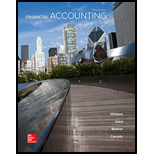
a.
Prepare a partial statement of
a.
Explanation of Solution
Statement of cash flows: Statement of cash flows reports all the cash transactions which are responsible for inflow and outflow of cash and result of these transactions is reported as ending balance of cash at the end of reported period. Statement of cash flows includes the changes in cash balance due to operating, investing, and financing activities.
Cash flows from operating activities: Cash flows from operating activity represent the net cash flows from the general operation of the business by comparing the cash receipt and cash payments.
Direct method: The direct method uses the cash basis of accounting for the preparation of the statement of cash flows. It takes into account those revenues and expenses for which cash is either received or paid.
The below table shows the way of calculation of cash flows from operating activities using direct method:
| Cash flows from operating activities (Direct method) |
| Add: Cash receipts. |
| Cash receipt from customer |
| Less: Cash payments: |
| To supplier |
| Interest expense |
| For operating expenses |
| Income tax expenses |
| Net cash provided from or used by operating activities |
Table (1)
The operating activities sections of the statement of cash flows:
| T Incorporation | ||
| Statement of Cash Flows Direct Method | ||
| For the Year Ended December 31, 2018 | ||
| Details | Amount ($) | Amount ($) |
| Cash flows from operating activities: | ||
| Cash receipts: | ||
| Cash received from customers | 2,920,000 | |
| Interest and dividend received | 171,000 | |
| Total cash receipts | 3,091,000 | |
| Cash payments: | ||
| Cash paid to suppliers and employees | (2,476,000) | |
| Interest paid | (176,000) | |
| Income taxes paid | (103,000) | |
| Total cash payments | (2,755,000) | |
| Net cash provided operating activities | $336,000 | |
Table (2)
Working notes:
The amount of cash receipts from customers:
Step 1: Calculate the change in accounts receivable.
Step 2: The Calculate the amount of cash receipts from customers.
The amount of interest and dividend received:
Step 1: Calculate the change in interest receivable.
Step 2: The Calculate the amount of cash receipts from customers.
Calculate the cash paid to supplier and employees.
Step 1: Calculate the change in inventory.
Step 2: Calculate the change in accounts payable.
Step 3: Calculate the amount of cash paid to suppliers of merchandise.
Step 4: Calculate the change in short-term prepayment.
Step 5: Calculate the change in accrued operating expenses payable.
Step 6: Calculate the amount paid for operating expenses.
Step 7: Calculate the amount of cash paid to supplier and employees.
Calculate the amount of cash paid for interest expenses:
Step 1: Calculate the change in accrued interest payable.
Step 2: Calculate the amount of cash paid for interest expenses.
Calculate the amount of cash paid for income tax expenses:
Step 1: Calculate the change in income taxes payable.
Step 2: Calculate the amount of cash paid for income taxes.
b.
Describe two other ways that cash flows from operations could be increased.
b.
Explanation of Solution
- Reduce the amount of inventory or clear the inventory in hand.
- The amount of short-term prepayments of expenses should be reduced.
- The purchases of goods and services on account should be paid in short-term period. This would lead to increase the cash flows from operations.
Want to see more full solutions like this?
Chapter 13 Solutions
Financial Accounting
- What amount of materials cost is included in ending work in process inventory?arrow_forwardCan you solve this financial accounting problem using appropriate financial principles?arrow_forwardPlease provide the correct answer to this general accounting problem using accurate calculations.arrow_forward

 AccountingAccountingISBN:9781337272094Author:WARREN, Carl S., Reeve, James M., Duchac, Jonathan E.Publisher:Cengage Learning,
AccountingAccountingISBN:9781337272094Author:WARREN, Carl S., Reeve, James M., Duchac, Jonathan E.Publisher:Cengage Learning, Accounting Information SystemsAccountingISBN:9781337619202Author:Hall, James A.Publisher:Cengage Learning,
Accounting Information SystemsAccountingISBN:9781337619202Author:Hall, James A.Publisher:Cengage Learning, Horngren's Cost Accounting: A Managerial Emphasis...AccountingISBN:9780134475585Author:Srikant M. Datar, Madhav V. RajanPublisher:PEARSON
Horngren's Cost Accounting: A Managerial Emphasis...AccountingISBN:9780134475585Author:Srikant M. Datar, Madhav V. RajanPublisher:PEARSON Intermediate AccountingAccountingISBN:9781259722660Author:J. David Spiceland, Mark W. Nelson, Wayne M ThomasPublisher:McGraw-Hill Education
Intermediate AccountingAccountingISBN:9781259722660Author:J. David Spiceland, Mark W. Nelson, Wayne M ThomasPublisher:McGraw-Hill Education Financial and Managerial AccountingAccountingISBN:9781259726705Author:John J Wild, Ken W. Shaw, Barbara Chiappetta Fundamental Accounting PrinciplesPublisher:McGraw-Hill Education
Financial and Managerial AccountingAccountingISBN:9781259726705Author:John J Wild, Ken W. Shaw, Barbara Chiappetta Fundamental Accounting PrinciplesPublisher:McGraw-Hill Education





